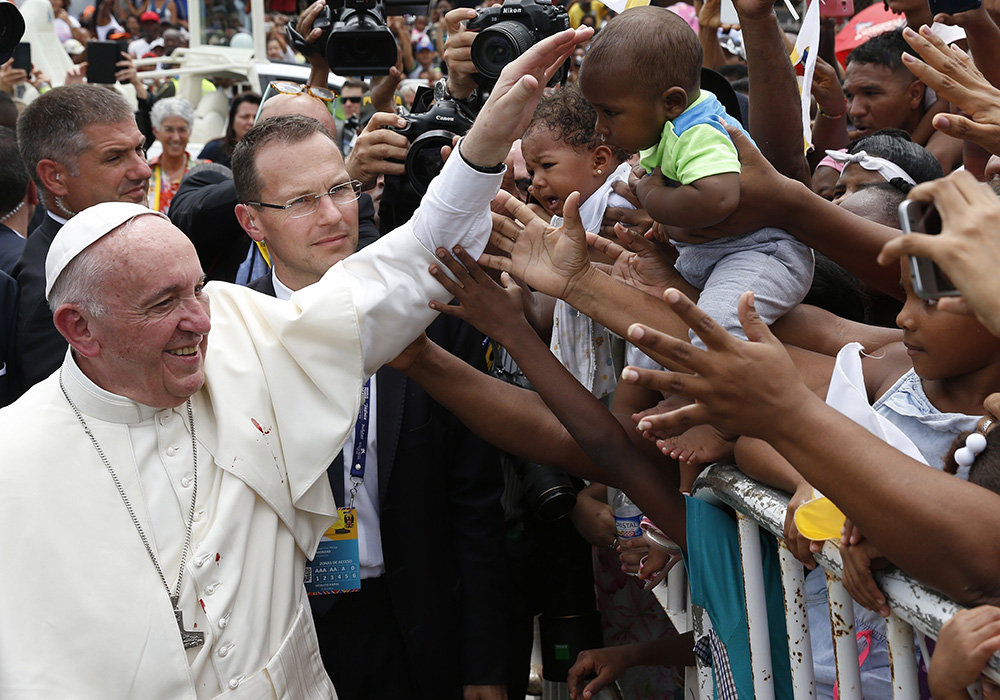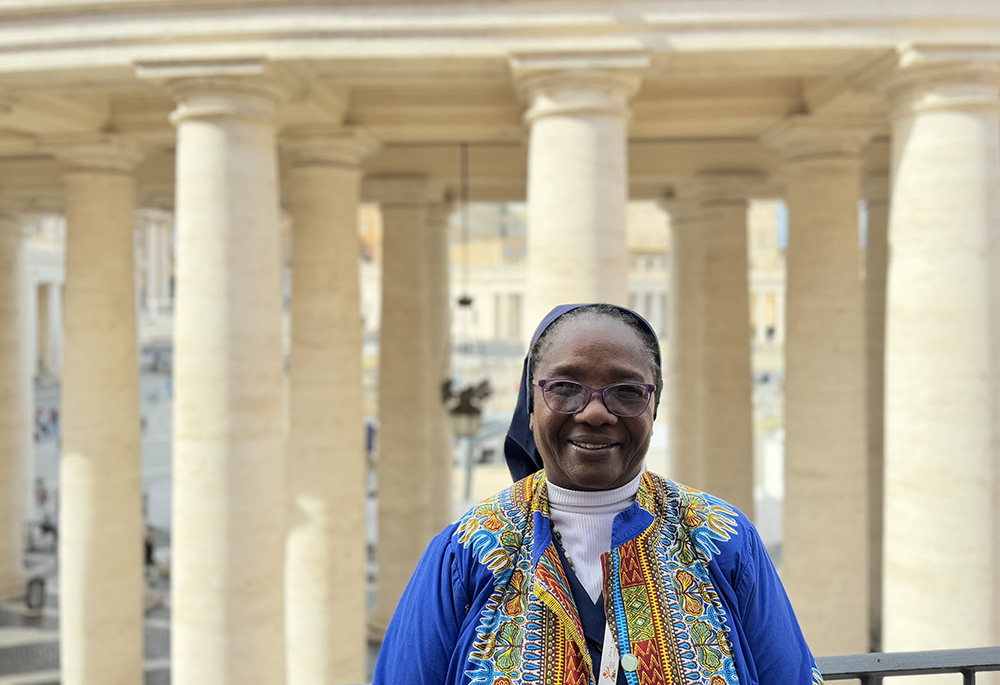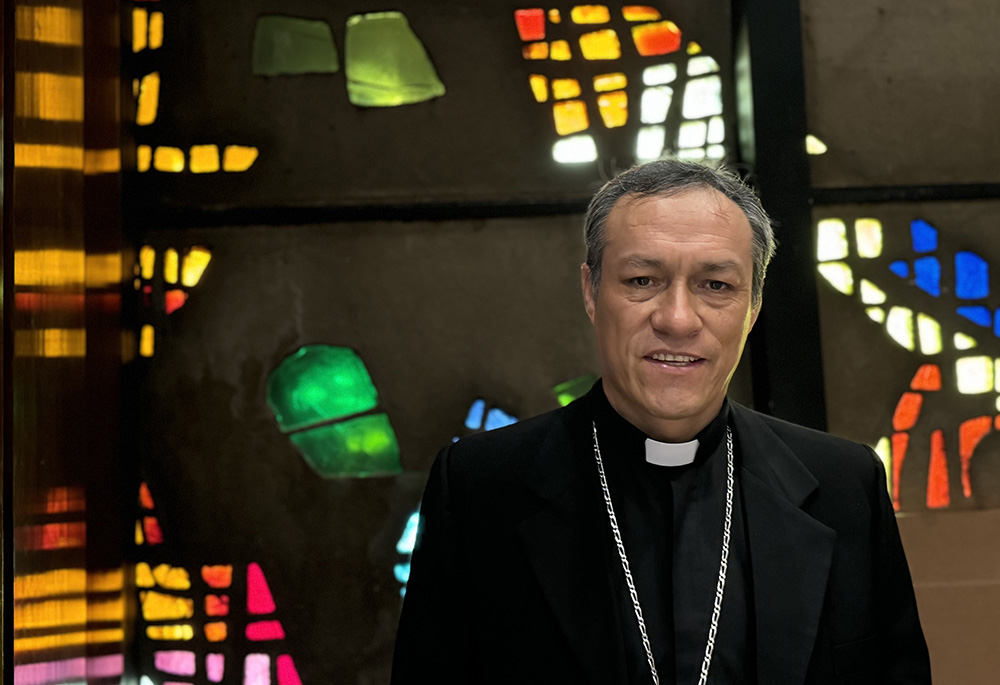
Pope Francis greets people near the Talitha Qum homeless shelter in Cartagena, Colombia, on Sept. 10, 2017. Pope Francis, formerly Argentine Cardinal Jorge Mario Bergoglio, died April 21, 2025, at age 88. (CNS/Paul Haring)
The doors of mercy, love and inclusion Pope Francis opened will be hard to close, no matter who succeeds him, say his supporters in Latin America, as they give thanks for having one their own lead the global church for 12 years.
"He was a Latin American pope … one well-versed in a new ecclesiology. He was a pope of the people," said Colombian Sr. Diana Herrera Castañeda, of the Dominican Sisters of St. Catherine of Siena in Bogotá. "He wanted to build a theology from the bottom up, a theology of respecting the vulnerable, of being with the poor."
When he was elected pope in 2013, Latin Americans observed that he took to the Vatican a certain way of talking about God and the kingdom that had sprung in Latin America after the region experienced military dictatorships and oligarchies, the large-scale exclusion and exploitation of the poor, of Indigenous people and their land, and other disadvantaged groups in Central and South America in the late 20th century.
'He was a Latin American pope … one well-versed in a new ecclesiology. He was a pope of the people. He wanted to build a theology from the bottom up, a theology of respecting the vulnerable, of being with the poor.'
—Sr. Diana Herrera Castañeda
That's where he also witnessed the cry of the Earth because of environmental problems church members faced in the Amazon, leading to his future advocacy for "the common home," said Herrera, of the communications commission for the Confederation of Latin American and Caribbean Religious, known as CLAR.
His conviction to care for the Earth also included care for Indigenous people who inhabited remote regions and the presence of God in their spirituality, said Sr. María Suyapa Cacho Álvarez, of the Daughters of Charity of St. Vincent de Paul in Honduras.
During her first meeting with Pope Francis in 2023, when she became a facilitator at the Vatican synod on synodality, she gave him a drum from her Garifuna community, Latin American Afro-descendants who blended into unions with Indigenous groups of the region. She pleaded with Pope Francis not to forget about the mistreatment of Afro communities, including in the church.
"He played [the drum] and gave me a warm smile, as if it were the smile of Jesus," she said, then he touched her hand as if saying she had his support. "He changed the face of the papacy. Before [Francis], you'd look at the pope as if he were far away, far from the people. The difference is that [Francis] showed his closeness with his words, a welcoming posture, by calling for the inclusion of others, his calling on young people and others, in general, without exception."

Sr. María Suyapa Cacho Álvarez, of the Daughters of Charity of St. Vincent de Paul, in this photo from Oct. 9, 2024, said the death of Pope Francis should not generate sadness. "He will never abandon us. He would never abandon his church. He will always remember us and he is like an angel, protecting his church. What God has taken part in, no one is capable of destroying it, no matter how bent a person is on destroying it," said the Honduran sister who was a facilitator at the synod on synodality. (GSR photo/Rhina Guidos)
As pope, he made multiple trips to Latin America, never as many as the region wanted but always leaving behind a notable mark.
In 2014, a year after his election, he began writing letters to then-U.S. President Barack Obama and Cuba's then-president Raul Castro, which led to a brief thawing between the two nations and limited restoration of diplomatic relations between the two countries, visiting both nations the following year.
In 2019, even though it resulted in a much smaller attendance than normal, he took World Youth Day to Central America for the first time in the history of the church, so that young Catholics in the region, who wouldn't have been able to afford the event in other parts of the world, could participate in the event set in Panama.
"Even though he didn't visit Latin America as often as other regions, his origins and his focus on the peripheries resounded profoundly in the region," said Peruvian Bishop Lizardo Estrada Herrera of Cuzco, secretary-general of the Conference of Latin American bishops, known as CELAM for its Spanish acronym.
The pope was loved in much of Latin America, he said, which is why it was puzzling and sad to see the animus he faced from some Catholics in the United States. "It saddens me," Estrada said.

Even though he didn't visit Latin America as often as other regions, Pope Francis' origins and his focus on the peripheries resounded profoundly in the region, said Peruvian Bishop Lizardo Estrada Herrera, in this file photo from July 9, 2024, in New York. Estrada, secretary-general of the Conference of Latin American bishops, CELAM, said he was saddened to hear of animus against the pope by some U.S. Catholics though he was loved in Latin America and the world. (GSR photo/Rhina Guidos)
But not every visit was a success. In early 2019, he faced backlash after returning from Chile, where he initially defended a bishop who faced accusations covering up for a priest who had sexually abused children. After an investigation, the accused bishop and others resigned, the pope publicly apologized and said he had made "grave errors" in his defense of the churchmen in Chile, then met and listened to abuse survivors at the Vatican.
One of them was Juan Carlos Cruz Chellew, who wrote in NCR in 2023 that at a time when he was in pain, lost, and without much will to live, "Pope Francis pulled me out of the grave and I will be grateful forever."
Cruz also lauded the pontiff for speaking for the LGBTQ community, putting him at odds with Catholics offended by his efforts to include them in the life of the church.
Advertisement
His efforts of inclusion sometimes often caused criticism, said Diego Mauro, a professor and researcher at Argentina's Consejo Nacional de Investigaciones, who focuses on the sociocultural and political history of Argentine Catholicism in the 20th century.
"Francis' argument that no one can shut the door on anyone else was perhaps the most radical definition of his papacy and the one that generated the most resistance," he said.
That included resistance from both sides.
'Francis' argument that no one can shut the door on anyone else was perhaps the most radical definition of his papacy and the one that generated the most resistance.'
—Diego Mauro, professor, researcher at Argentina's Consejo Nacional de Investigaciones
The synod, Mauro said, was an example of the pope trying to be neutral, listening and not always supporting the views of the different churches, from the more conservative ones in Africa, nor also supporting the changes promoted by the more progressive sectors in Germany, Mauro said.
"For Francis, these sectors forgot that the church is diverse and that any change must be built by listening to all the different churches … balance is difficult and unstable, but Francis managed to contain the moving forces in the universal church and move beyond tensions," Mauro said.
For Pope Francis, the church was not "an exclusive club with many accreditations and moral conditions," he added.
He also sprinkled unexpected surprises in Latin America such as when he elevated El Salvador's Gregorio Rosa Chavez, the auxiliary bishop of San Salvador, El Salvador, to the title of cardinal — a first in the church. Rosa sent condolences April 21 as Latin America woke up to the shock of the news.
"Our Holy Father lived his Passover with Christ," he wrote. "We give thanks for his life and for his extraordinary ministry. Requiescat in Pace."
But Pope Francis' passing should not generate sadness, Honduras' Cacho said. The mission continues, added CELAM's Estrada.
"He will never abandon us. He would never abandon his church," Cacho said. "He will always remember us and he is like an angel, protecting his church. What God has taken part in, no one is capable of destroying it, no matter how bent a person is on destroying it."





